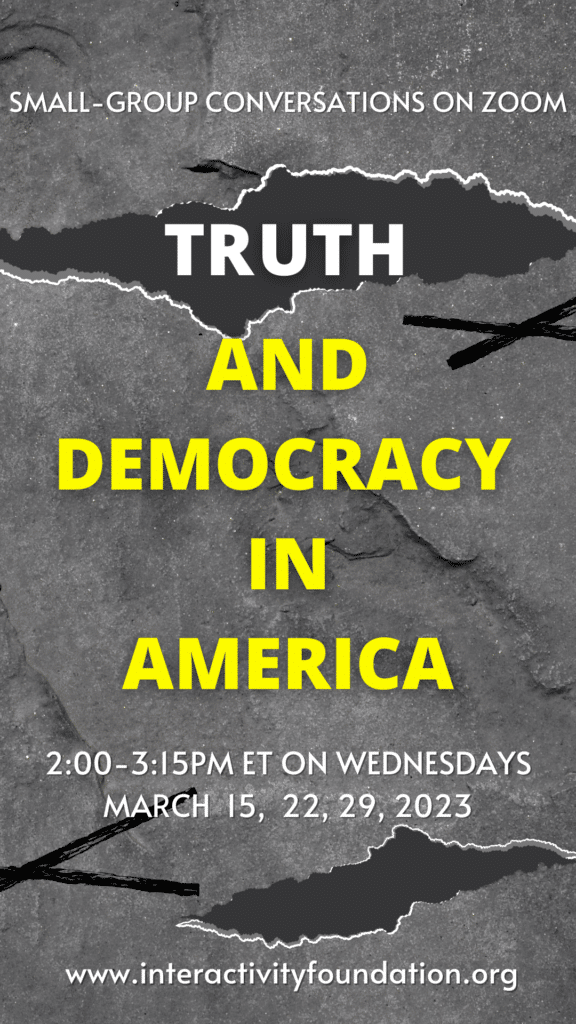
In this second session of our small-group, online conversation series about Truth & Democracy in America, citizens from around the country gathered online via Zoom for an exploratory discussion of several key questions about science, truth, and democracy. Below is a summary of the different ideas and common themes that emerged from each small-group’s discussion.
Whether or not you’ve participated in either of the first two sessions, we hope you’ll consider joining us for the third and final discussion in this 3-part series, which will be held this Wednesday, March 29nd, at 2:00 pm ET, and will focus on exploring ideas about education, truth, and democracy. You can register for this final session HERE.
Discussion Summary
Interrelated concerns about science, truth, and democracy
Concerns about our understanding of science as a process for understanding reality
- Focus on science as a process for gaining knowledge, not a static set of facts
- Scientific findings are inherently conditional and subject to change based on new evidence etc., yet when findings are later corrected, there can be a public backlash, fostering public cynicism about all science
- The public needs a scientifically-informed sense of the degree of certainty for scientific conclusions together with the relative risks and benefits of relying on those conclusions
- We often have blinders or unquestioned assumptions about accepting scientific findings without critically evaluating the funding, framing, and evidence of those findings
Concerns about how we communicate and educate about science
- “Dumbing down” science for public consumption can create problems when complexity and nuance are essential for understanding a complex reality
- The news media often oversimplifies and overhypes scientific results, which distorts reality and can encourage distrust of science when new data or new theories emerge
- If science education focuses more on facts than on the processes of scientific research, then it can lead to distrust of science, or even conspiratorial thinking, when those original findings are corrected or refuted.
- The lack of capacity for critical evaluation by the news media and by the public can lead to undue public attention for poorly done science
- The public is often overwhelmed by the sheer volume, complexity, and competing versions of scientific information, which also creates an opening for mis- and disinformation
- Science messaging matters–especially in a digital era when messages are manipulated to fit the biases of particular audiences
Concerns about commercial and partisan political influence over science
- Concerns about how science is being intentionally manipulated and distorted and about the continued growth of advocacy “science” for commercial or partisan purposes
- Concerns about the partisan “weaponization” of science and the intentional discrediting of science and individual scientists for partisan gain
- Concerns about funding sources for scientific research, and whether these sources compromise the trustworthiness of scientific findings
- Relying on commercial funding brings concerns that the research is motivated to support results favorable to their profits (look at the work of the tobacco industry or fossil fuel industry scientists)
- Concerns about “following the money” in order to evaluate scientific research and questions about how commercial interests can, and perhaps should, undermine trust in the results of such research
- Concerns about the decrease of public funding for scientific research, which means that research is shaped by the profit or partisan interests of private funders, and not by the public interest
- Concerns about the cherry-picking of data as another way that “science” is misused, which in turn creates more distrust of science
- Concerns about anti-science rhetoric in our public discourse, which opens up incentives for peddling paranoia and conspiracy theories
- Concerns about the way that political polarization leads more people to disregard all scientific findings on many issues, including climate change, vaccines, public health generally, etc.
- Concerns about cultural and class differences in how science is viewed across the population
Concerns and questions about the ethics of science, how it is governed, and about making decisions for the common good
- How do we navigate between truth and belief? Whose truth, whose belief?
- Science also needs to recognize its limits and that it cannot explain everything or solve every problem, particularly those involving matters of justice, love, spirit, or religion
- Where are the ethical guardrails and how do we set them?
- How might science help us navigate the ethical considerations of new scientific discoveries–or do we need other ways of knowing for determining what is right and what is in the public interest?
- How can we include other, more holistic and less reductive ways of understanding that incorporate broader interests and perspectives, including indigenous cultural knowledge and traditions?
- How can we balance our decisions among the public good, virtue, and personal freedoms?
Concerns that science reflects the biases and prejudices of our broader society
- Sexism especially plays powerful role in determining who can do science–which in turn affects the areas of study or how research studies are framed, which in turn shapes research results or the kind of things we think we know
- Racism similarly affects our science in what gets studied, what gets ignored, how research is conducted, and how scientific studies are framed, communicated, and used
- We also often create and even rely on artificial divides between the arts and sciences, especially within American culture (for example, the notion that if you are artistically minded, then you can’t or shouldn’t do science–and vice versa)
What roles does, could, or should science play in a democracy?
- Science can help democracies solve or address critical governance problems, including for example public health, climate change, public safety, agriculture, transportation, the environment, etc.
- Keep in mind that science is a tool that can be used for good or ill by democracies or others
- Democracy cannot function without science, since without it we would lack the knowledge and related technologies that make our communities work
- There can be an inherent tension between science and democratic governance in that science can be slow (requiring the patient consideration of evidence) whereas government often needs to act quickly
- This can lead to government action based on incomplete understandings of the relevant realities
- The social science can contribute a better understanding of how humans communicate and interact in groups, etc., which can improve the work of democratic governance
- Democratic governance doesn’t need to worship science, but it won’t do well if it doesn’t take due note of science
Looking ahead: possibilities for a more mutually supportive relationship among science, truth, and democracy
Improve our education and understanding of science and the scientific method
- Think with more humility about science and help the public live with the contingent nature of scientific truths
- Publicly fund science education in a way that is free from political and commercial interference
- Integrate scientific research into education at the earliest grades, with a grade-appropriate approach to teaching the processes of science and the capacities for critical thinking
- We must cultivate critical thinking skills from early age to old age so that the public is able to evaluate information and question assumptions
- Engage the public in Citizen Science (involving the public in, for example, gathering data on bird counts, climate change indicators, water quality) to improve public understanding of science and depoliticize science:
- Citizen participants can better see how scientific findings are contingent, not absolute
- Doing science is the best way to teach it
- Citizen science doesn’t require expensive equipment
- Citizen science can bring people together for interactions across the political spectrum
- Educate citizens in the effective use of tools and resources for sorting through information
Improve how we communicate about science:
- Improve news reporting about science and support public educational outreach to inform the public about science
- Refocus science journalism on informing the public that science is an ongoing process of discovery, not a set of unchanging truths
- Pair scientists with communication partners to communicate science to the general public
- Highlight the successes, the possibilities, and interest in science in a way that tells a story that will help focus the public’s attention: what’s new, useful, what’s next?
- Keep in mind how people actually consume their news–in short, summary bits that explain why it matters to them
De-politicize science: fix our democracy and our governance of science
- Create buffers for scientific research to resist distortions from commercial or partisan political interests
- Increase and solidify public funding of scientific research in a way that allows it to focus more on the public good and makes it independent from commercial or partisan political interests
- Need to build in protections against government takeover of science (avoid the problems of Nazi Germany)
- Need to build in protections, such as campaign finance reforms, to resist the effects of corporate campaign donations influencing governmental funding decisions on scientific research
- Private enterprise can also play a vital role in the advancement of science, but it shouldn’t be the major role
- Sustain a combined public/private relationship with science to prevent abuse of the system by either sector
- Create some combination of federal agencies, academic institutions, and citizen panels or review boards that have public accountability and will be responsible for sorting through science and upholding scientific standards
Fix our society: reduce our polarization and the politicization of everything
- Strengthen our common values and interests to help re-establish a belief in a shared reality and the common good
- Use science to help research and identify structures, rules, frameworks, best practices and other interventions that might diminish in-group/out-group thinking
- Identify key concerns of certain groups so our democracy can better address those concerns and rebuild public trust
- Focus on engaging citizens with scientific discussions so that they will feel less exclusion
Elevate our regard for science and scientists as experts in their respective fields and protect them from the possible excesses of popular rule
- Develop the public’s understanding that science isn’t a popularity contest–and that the best science should inform policy
- Because the public can be readily manipulated by mis- and disinformation, there need to be democratic controls (such as representative democracy entails) to ensure that we can fully benefit from scientific research
- Increase support, trust, and respect for organizations like the NSF
Integrate science with other paths to understanding and traditions for a more holistic approach to the truth and for improved public trust by incorporating–
- Knowledge from other endeavors, cultures, and traditions, including the arts, lived experience, practical know-how, etc.
- Multi-disciplinary learning, combining, for example, history, philosophy, psychology, sociology
- Perspectives and interests of the environment, the planet, and its plant and animal life
- Best practices of international communities and models of international governance for scientific research, cooperation and data sharing


